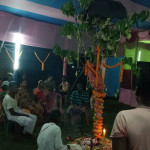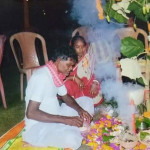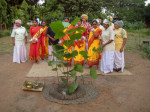History & Traditions
This festival, celebrated with great enthusiasm across tea gardens and tribal villages, embodies the traditional wisdom that humans and nature are deeply interconnected — a belief that continues to define Assam’s cultural identity.
When Is Karam Puja Celebrated?
Karam Puja is observed annually on the night of Bhado Ekadashi, which usually falls in August or September. This period coincides with the crucial time in the agricultural cycle when crops are maturing, and farmers pray for a successful harvest season.
Communities prepare for weeks in advance — building ceremonial spaces, collecting Karam branches, and rehearsing folk songs and dances. The festival begins in the evening and continues through the night, blending devotion with joy, faith, and festivity.
The Spiritual Significance of Karam Puja
The heart of Karam Puja lies in the worship of Karam Devta and Mother Earth, who symbolize the divine cycle of life, growth, and karma. Devotees believe that worshipping the deity brings good harvests, family well-being, and protection from misfortune.
For the tea tribe communities, this celebration is not just religious—it’s a reminder of their ancient connection with the land. Through rituals, songs, and offerings, people express their gratitude to the soil that sustains them.
Women, in particular, play an essential role in the rituals, praying for the prosperity of their families and a harmonious marital life. The act of offering prayers to the Earth reflects an age-old belief — that all creation and energy flow from Mother Earth herself.
Ritual Practices of Karam Puja
The ritual of Karam Puja is both sacred and symbolic. Early in the evening, villagers collect a branch of the Karam tree (considered divine) and bring it to the village courtyard with song and drumbeats.
The main rituals include:
-
Installing the Karam branch in a sanctified place.
-
Decorating the site with rice, flowers, fruits, grains, and oil lamps.
-
Priests and elders reciting folk tales and prayers invoking Karam Devta’s blessings.
-
Women performing rituals for family harmony and fertility.
-
Singing and dancing through the night in front of the sacred Karam branch.
Installing the Karam branch in a sanctified place.
Decorating the site with rice, flowers, fruits, grains, and oil lamps.
Priests and elders reciting folk tales and prayers invoking Karam Devta’s blessings.
Women performing rituals for family harmony and fertility.
Singing and dancing through the night in front of the sacred Karam branch.
These practices create a space where community, devotion, and nature merge seamlessly into one sacred celebration.
Jhumair Nritya – The Dance of Devotion and Joy
One of the most captivating parts of Karam Puja is the Jhumair Nritya, a traditional group dance performed around the Karam branch. Men and women form circles, holding hands and swaying rhythmically to the beats of the Dholl, Madal, and Taal.
The songs, known as Karam Geet, narrate stories of love, nature, and devotion. The dance continues late into the night under the moonlit sky, creating an atmosphere of unity, energy, and celebration. Jhumair Nritya is not only an artistic expression but also a spiritual offering, symbolizing the community’s gratitude to Mother Earth.
Karam Puja and the Tea Tribe Community
The festival is deeply rooted in the tea tribe culture of Assam, whose ancestors migrated from states like Jharkhand, Chhattisgarh, Bihar, and Odisha during the colonial era. Despite their migration, these communities have preserved their unique tribal customs, music, and rituals like Karam Puja.
In Assam, the tea tribes have made Karam Puja a symbol of identity — showcasing their devotion to nature, love for art, and strong sense of community. Today, the festival is celebrated not just in tea gardens but across towns and cultural centers, reflecting Assam’s inclusive heritage.
Environmental Message and Agricultural Connection
Beyond its rituals, Karam Puja carries an important environmental and ecological message. The act of worshipping the Karam tree symbolizes reverence for nature’s life-giving power and the importance of maintaining balance with the environment.
The offerings made during the puja — rice, grains, fruits — are symbols of the harvest, representing human dependence on agriculture and nature’s cycles. Through this festival, the community acknowledges the need to respect and protect Mother Earth.
Night-long Celebrations and Community Bonding
Karam Puja night is filled with music, laughter, and community gatherings. After the rituals, villagers feast on traditional dishes made from newly harvested crops. Elders share stories, and youths participate in singing competitions, showcasing folk songs and instruments.
The festival fosters a spirit of togetherness and equality, as everyone — regardless of age or status — contributes to the celebrations. The night becomes a sacred bridge between generations, where traditions are passed down through stories and performance.
Modern-Day Observance and Cultural Revival
In recent years, cultural organizations and schools have begun organizing Karam Puja festivals to promote tribal heritage and environmental awareness. In urban areas, youth groups perform Jhumair Nritya and organize exhibitions displaying traditional attire, crafts, and music.
This revival not only strengthens tribal identity but also spreads awareness about the cultural diversity of Assam and its indigenous traditions.
Conclusion – The Festival of Nature, Unity, and Faith
Karam Puja stands as a symbol of Assam’s spiritual richness and ecological wisdom. For the tea tribe communities, it represents more than a ritual — it’s an annual reminder of gratitude, harmony, and balance between humans and nature.
From the rhythmic Jhumair dances to the sacred Karam tree rituals, every element of this festival carries a timeless message: Respect the Earth, celebrate life, and act with good karma.
In a modern world where environmental consciousness is becoming vital, Karam Puja continues to inspire generations to live in unity with the natural world — keeping Assam’s cultural roots alive and flourishing.
FAQs About Karam Puja with Short Answers
Q1. What is Karam Puja?
Karam Puja is a tribal harvest festival in Assam that honors Mother Earth and Karam Devta, the deity of fertility and action.
Q2. When is Karam Puja celebrated?
It is celebrated on Bhado Ekadashi, usually in mid-August or early September.
Q3. Who celebrates Karam Puja in Assam?
The festival is mainly celebrated by the tea tribe and Adivasi communities of Assam.
Q4. What is the main ritual of Karam Puja?
The worship of a sacred Karam tree branch with offerings of rice, fruits, and grains.
Q5. What is the significance of the Karam tree?
It symbolizes fertility, prosperity, and the life-giving power of nature.
Q6. What dance is performed during Karam Puja?
The traditional Jhumair Nritya, a rhythmic group dance performed through the night.
Q7. What does Karam Devta represent?
Karam Devta represents karma (action), creation, and protection from evil forces.
Q8. What foods are prepared during Karam Puja?
Traditional items like rice, pitha, fruits, and homegrown grains are offered and shared.
Q9. How does Karam Puja promote environmental awareness?
It teaches respect for nature, sustainable agriculture, and ecological balance.
Q10. Why is Karam Puja important in modern Assam?
It preserves the cultural identity of tea tribes and promotes unity, gratitude, and environmental care.





